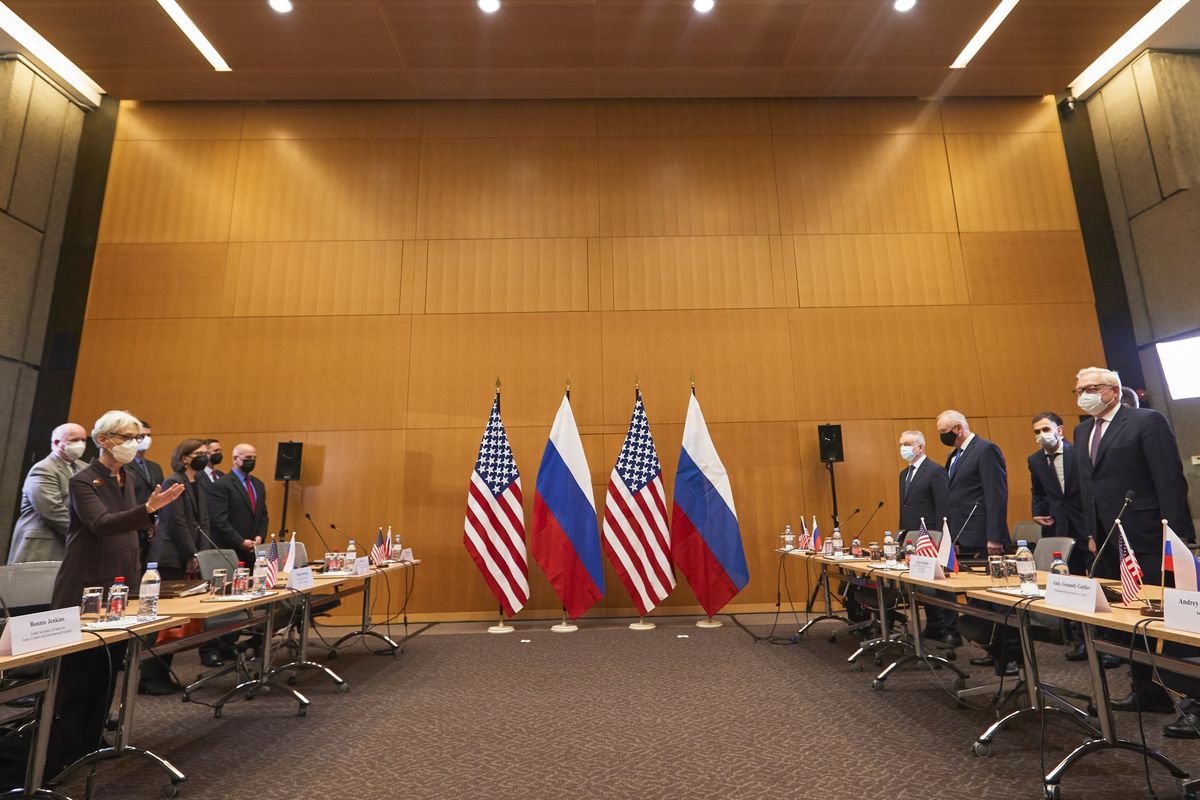Kremlin: Not much optimism after Russia-US talks on Ukraine

MOSCOW — The Kremlin said Tuesday the security talks with the U.S. amid tensions over Ukraine have given little reason for optimism, adding that Russia would wait for the outcome of other meetings this week before deciding whether it’s worthwhile to continue negotiations.
The U.S. envoy to NATO set a tough tone for the next round of talks with Moscow, ruling out any concessions on the alliance’s eastward expansion amid a Russian troops buildup near Ukraine.
“We will not allow anyone to slam NATO’s open-door policy shut,” said U.S. Ambassador Julianne Smith.
At Monday’s Geneva talks, Moscow insisted on guarantees to halt NATO’s expansion and even roll back the military alliance’s deployments in Eastern Europe, while Washington firmly rejected the demands as a nonstarter.
Kremlin spokesman Dmitry Peskov noted that while the talks were “open, comprehensive and direct,” he emphasized that it’s the result that matters.
“So far, let’s say we see no significant reason for optimism,” he said in a conference call with reporters.
Peskov said the Kremlin will watch a round of Russia-NATO talks in Brussels on Wednesday and a meeting of the Organization for Security and Cooperation in Europe in Vienna on Thursday to determine whether it would make sense to continue the negotiations. He noted that Russia isn’t setting any deadlines for the talks but wouldn’t accept dragging them out.
Speaking ahead of the talks in Brussels, Smith warned that “not a single ally inside the NATO alliance is willing to budge or negotiate anything as it relates to NATO’s open-door policy.”
“We stand firm in pushing back on security proposals that are simply nonstarters,” Smith told reporters.
Russia’s troop buildup near Ukraine’s border has stoked fears of a possible invasion. Moscow says it has no plans to attack its neighbor.
President Vladimir Putin has warned that Moscow would take unspecified “military-technical measures” if the U.S. and its allies fail to meet its demands. Putin on Tuesday held a video call with members of his Security Council, saying in brief introductory remarks that he wanted to discuss unspecified issues related to security and infrastructure in border areas.
White House press secretary Jen Psaki said it was “too early to tell whether the Russians are serious about the path to diplomacy or not,” or whether they will use the talks as a “pretext to claim that diplomacy couldn’t possibly work” and move forward with an invasion.
Psaki sidestepped questions about whether the White House agreed with Peskov’s assertion that the Geneva’s talks did not provide reason for greater optimism. She noted, however, that the talks had included discussions about the placement of missiles in Europe and placing reciprocal limits on military exercises.
“There are a range of discussions that can be a part of a diplomatic path, but ultimately it’s up to the Russians to determine about whether they’re going to take a serious approach,” she said.
Russia’s Deputy Foreign Minister Sergei Ryabkov who led the Russian delegation at the talks warned after Monday’s session that it would be hard to make any progress on other issues if the U.S. and its allies stonewall Moscow’s demand for guarantees precluding NATO’s expansion.
The U.S. and its allies have roundly rejected the demand for NATO not to admit Ukraine or any other new members, emphasizing that a key alliance principle is that membership is open to any qualifying country and no outsiders have veto power. At the same time, Washington and NATO say they are ready to discuss arms control, confidence-building measures, greater transparency and risk reduction if Russia takes a constructive stance.
U.S. Deputy Secretary of State Wendy Sherman, who led the U.S. delegation in Geneva, said she briefed the North Atlantic Council on the discussions. “The United States is committed to working in lockstep with our Allies and partners to urge de-escalation and respond to the security crisis caused by Russia,” she tweeted.
The U.S. and its allies have warned Russia that it will face unprecedented sanctions if it attacks Ukraine. European Council President Charles Michel reiterated that “we have clearly said that if there was to be a military offensive against Ukraine, there would be a massive reaction from the European Union in coordination with our partners and allies.”
Russia has rejected Washington’s demand for a pullback of its troops from the areas close to Ukraine, saying it has the right to deploy them wherever it considers necessary. The U.S. has estimated that Russia has amassed an estimated 100,000 troops near Ukraine.
Amid the tensions, the Russian military said Tuesday that 3,000 troops and 300 armored vehicles were taking part in drills at firing ranges in the Voronezh, Belgorod, Bryansk and Smolensk regions near Ukraine.
In 2014, Russia annexed Ukraine’s Crimean Peninsula after the ouster of its Moscow-friendly leader and threw its weight behind a separatist insurgency in the country’s east, where more than seven years of fighting has killed over 14,000 people.
A 2015 peace deal brokered by France and Germany has helped end large-scale battles, but frequent skirmishes have continued and efforts to negotiate a political settlement have failed.
Ukrainian President Volodymyr Zelenskyy met Tuesday with French and German officials who visited Kyiv after talks in Moscow the previous week to discuss prospects for another four-way meeting of the leaders of Russia, Ukraine, France and Germany on the conflict.
“It’s time to have substantive talks on ending the conflict, and we are ready to make the necessary decisions during a new summit of the four countries’ leaders,” Zelenskyy said.
French President Emmanuel Macron emphasized that the four-way talks remain relevant and praised the Geneva negotiations, saying “it’s a very good thing that the U.S. and Russia speak to each other.”